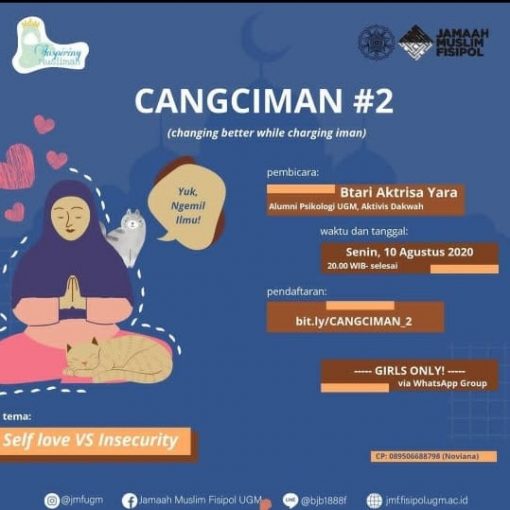
Yogyakarta, 10 Agustus 2020—Jamaah Muslim Fisipol UGM is back with the second CHANGCIMAN (Changing better while charging iman) on Sunday night (10/8). The event was themed “Self Love VS Insecurity” which was held through the Whatsapp Group platform and was only open for women. Btari Aktrisa Yara, an alumni from UGM Psychology Department as well as a dakwah activist, is a speaker in this discussion. The event started at 8 pm and was moderated by Lina, a PSdK 2018 university student.
After introducing the speaker, the moderator allowed the speaker to start talking about the material. In her elaboration, Btari explained the link between insecurity and self love. However, before going further into the topic, she first talked about the definition of each term. According to her, insecurity is a basic emotion that shapes our self image and our attitude. A survey found that 60% of women have self deprecating thoughts at least every week.
One of the reasons for insecurity or the existence of a critical inner voice is our past experiences. Quoting Dr. Lisa Firestone, “Our critical inner voice is created from early painful experiences when we witnessed or experienced painful attitudes towards us or towards the people who are close to us. When we grow up, we unknowingly adopt and integrate this destructive mindset which can hurt ourselves and other people.”
Simply put, insecurity is commonly caused by painful words that we internalize from our family, school, work environment, friends, etc. “It is clear that there are a lot of things that shape our critical voice. It could come from negative attitudes directed to us as well as parents’ attitudes towards themselves,” Btari said. “As we grow older we internalize these perspectives. We keep this perspective alive by believing in our insecurity as we experience our life,” she said.
Meanwhile, self love is not simply about feeling good. Self love is a choice. It’s a way to communicate with ourselves by using our experience in life and without judging ourselves. Self love can also be understood as how we see and treat ourselves. It’s an active, not passive action.
Research has shown that loving ourselves is linked to decreasing anxiety and depression, a better recovery from stress, a more optimistic outlook on life, and a positive change of behaviour. Btari said that loving ourselves makes our life happier and healthier in every aspect. “Self love can affect our choice in relationship, future career, how to educate our children, how we interact with other people, and how we solve problems in our life,” she elaborated.
Maybe we don’t love ourselves because of many reasons or because it has become a habit. It could be because of the action of the people around us, traumatic experiences in our life, not having a good role model, or because we have practiced negative self talk for a long time. However, one thing that needs to be remembered is that a low self esteem because of the lack of self love is not reality, it’s simply our perception of what is real.
From the material that has already been explained, there is a link between insecurity and self love. The lack of capacity to love ourselves will lead to insecurity and will make us not be able to perform fully in our roles. Btari also gave some self love tips to decrease insecurity which are to recognize our feelings, accept those feelings, think about our feelings from another perspective, forgiving ourselves, being brave to say no, being a part of the community, and receiving help from others. “We are made to live with other people because we are a social person. So, don’t be afraid to ask and receive help from people closest to us or from professionals to solve our life problems and to love ourselves more,” Btari said.
After talking about the material, the moderator opened the question and answer session. Finally, the discussion ended at 10 pm.
